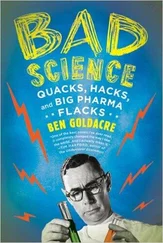Ben Goldacre - Bad Science
Здесь есть возможность читать онлайн «Ben Goldacre - Bad Science» — ознакомительный отрывок электронной книги совершенно бесплатно, а после прочтения отрывка купить полную версию. В некоторых случаях можно слушать аудио, скачать через торрент в формате fb2 и присутствует краткое содержание. Жанр: Публицистика, на английском языке. Описание произведения, (предисловие) а так же отзывы посетителей доступны на портале библиотеки ЛибКат.
- Название:Bad Science
- Автор:
- Жанр:
- Год:неизвестен
- ISBN:нет данных
- Рейтинг книги:5 / 5. Голосов: 1
-
Избранное:Добавить в избранное
- Отзывы:
-
Ваша оценка:
- 100
- 1
- 2
- 3
- 4
- 5
Bad Science: краткое содержание, описание и аннотация
Предлагаем к чтению аннотацию, описание, краткое содержание или предисловие (зависит от того, что написал сам автор книги «Bad Science»). Если вы не нашли необходимую информацию о книге — напишите в комментариях, мы постараемся отыскать её.
Bad Science — читать онлайн ознакомительный отрывок
Ниже представлен текст книги, разбитый по страницам. Система сохранения места последней прочитанной страницы, позволяет с удобством читать онлайн бесплатно книгу «Bad Science», без необходимости каждый раз заново искать на чём Вы остановились. Поставьте закладку, и сможете в любой момент перейти на страницу, на которой закончили чтение.
Интервал:
Закладка:
The scientific content of stories – the actual experimental evidence – is brushed over and replaced with didactic statements from authority figures on either side of the debate, which contributes to a pervasive sense that scientific advice is somehow arbitrary, and predicated upon a social role – the ‘expert’ – rather than on transparent and readily understandable empirical evidence. Worse than this, other elements are brought into the foreground: political issues, Tony Blair’s refusal to say whether his baby had received the vaccine, mythical narratives, a lionised ‘maverick’ scientist, and emotive appeals from parents.
A reasonable member of the public, primed with such a compelling battery of human narrative, would be perfectly entitled to regard any expert who claimed MMR was safe as thoughtless and dismissive, especially if that claim came without any apparent supporting evidence.
The story was also compelling because, like GM food, the MMR story seemed to fit a fairly simple moral template, and one which I myself would subscribe to: big corporations are often dodgy, and politicians are not to be trusted. But it matters whether your political and moral hunches are carried in the right vehicle. Speaking only for myself, I am very wary of drug companies, not because I think all medicine is bad, but because I know they have hidden unflattering data, and because I have seen their promotional material misrepresent science. I also happen to be very wary of GM food – but not because of any inherent flaws in the technology, and not because I think it is uniquely dangerous. Somewhere between splicing in genes for products that will treat haemophilia at one end, and releasing genes for antibiotic resistance into the wild at the other, lies a sensible middle path for the regulation of GM, but there’s nothing desperately remarkable or uniquely dangerous about it as a technology.
Despite all that, I remain extremely wary of GM for reasons that have nothing to do with the science, simply because it has created a dangerous power shift in agriculture, and ‘terminator seeds’, which die at the end of the season, are a way to increase farmers’ dependency, both nationally and in the developing world, while placing the global food supply in the hands of multinational corporations. If you really want to dig deeper, Monsanto is also very simply an unpleasant company (it made Agent Orange during the Vietnam War, for example).
Witnessing the blind, seething, thoughtless campaigns against MMR and GM – which mirror the infantile train of thought that ‘homeopathy works because the Vioxx side-effects were covered up by Merck’ – it’s easy to experience a pervasive sense of lost political opportunities, that somehow all of our valuable indignation about development issues, the role of big money in our society, and frank corporate malpractice, is being diverted away from anywhere it could be valid and useful, and into puerile, mythical fantasies. It strikes me that if you genuinely care about big business, the environment and health, then you’re wasting your time with jokers like Pusztai and Wakefield.
Science coverage is further crippled, of course, by the fact that the subject can be quite difficult to understand. This in itself can seem like an insult to intelligent people, like journalists, who fancy themselves as able to understand most things, but there has also been an acceleration in complexity in recent times. Fifty years ago you could sketch out a full explanation of how an AM radio worked on the back of a napkin, using basic school-level knowledge of science, and build a crystal set in a classroom which was essentially the same as the one in your car. When your parents were young they could fix their own car, and understand the science behind most of the everyday technology they encountered, but this is no longer the case. Even a geek today would struggle to give an explanation of how his mobile phone works, because technology has become more difficult to understand and explain, and everyday gadgets have taken on a ‘black box’ complexity that can feel sinister, as well as intellectually undermining. The seeds were sown.
But we should return to the point. If there was little science, then what did appear in all these long stories on MMR? Going back to the 2002 data from the ESRC, only a quarter mentioned Andrew Wakefield, which seems odd, considering he was the cornerstone of the story. This created the erroneous impression that there was a large body of medical opinion which was suspicious of MMR, rather than just one ‘maverick’. Less than a third of broadsheet reports referred to the overwhelming evidence that MMR is safe, and only 11 per cent mentioned that it is regarded as safe in the ninety other countries in which it is used.
It was rare to find much discussion of the evidence at all, as it was considered too complicated, and when doctors tried to explain it they were frequently shouted down, or worse still, their explanations were condensed into bland statements that ‘science had shown’ there was nothing to worry about. This uninformative dismissal was pitted against the emotive concerns of distressed parents.
As 2002 wore on, things got really strange. Some newspapers, such as the Daily Mail and the Daily Telegraph , made MMR the focus of a massive political campaign, and the beatification of Wakefield reached a kind of fever pitch. Lorraine Fraser had an exclusive interview with him in the Telegraph in which he was described as ‘a champion of patients who feel their fears have been ignored’. She wrote a dozen similar articles over the next year (and her reward came when she was named British Press Awards Health Writer of the Year 2002, a gong I do not myself expect to receive).
Justine Picardie did a lavish photo feature on Wakefield, his house and his family for the Telegraph Saturday magazine. Andy is, she tells us, ‘a handsome, glossy-haired hero to families of autistic children’. How are the family? ‘A likeable, lively family, the kind you would be happy to have as friends, pitted against mysterious forces who have planted bugging devices and have stolen patients’ records in “apparently inexplicable” burglaries.’ She fantasises – and I absolutely promise you I’m not making this up – about a Hollywood depiction of Wakefield’s heroic struggle, with Russell Crowe playing the lead ‘opposite Julia Roberts as a feisty single mother fighting for justice for her child’.
The evidence on MMR
So what is the evidence on the safety of MMR?
There are a number of ways to approach the evidence on the safety of a given intervention, depending on how much attention you have to give. The simplest approach is to pick an arbitrary authority figure: a doctor, perhaps, although this seems not to be appealing (in surveys people say they trust doctors the most, and journalists the least: this shows the flaw in that kind of survey).
You could take another, larger authority at face value, if there is one that suits you. The Institute of Medicine, the Royal Colleges, the NHS, and more, all came out in support of MMR, but this was apparently not sufficient to convince. You could offer information: an NHS website at mmrthefacts.nhs.uk started with the phrase ‘MMR is safe’ (literally), and allowed the reader to drill down to the detail of individual studies. But that too did little to stem the tide. Once a scare is running, perhaps every refutation can seem like an admission of guilt, drawing attention to the scare.
The Cochrane Collaboration is as blemishless as they come, and it has done a systematic review of the literature on MMR, concluding that there was no evidence that it is unsafe (although it didn’t appear until 2005). This reviewed the data the media had systematically ignored: what was in it?
Читать дальшеИнтервал:
Закладка:
Похожие книги на «Bad Science»
Представляем Вашему вниманию похожие книги на «Bad Science» списком для выбора. Мы отобрали схожую по названию и смыслу литературу в надежде предоставить читателям больше вариантов отыскать новые, интересные, ещё непрочитанные произведения.
Обсуждение, отзывы о книге «Bad Science» и просто собственные мнения читателей. Оставьте ваши комментарии, напишите, что Вы думаете о произведении, его смысле или главных героях. Укажите что конкретно понравилось, а что нет, и почему Вы так считаете.





![Роман Зыков - Роман с Data Science. Как монетизировать большие данные [litres]](/books/438007/roman-zykov-roman-s-data-science-kak-monetizirova-thumb.webp)






